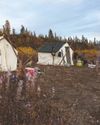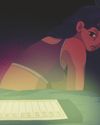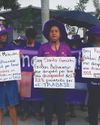Maxine’s great-grandmother, Ikuaalaaq, stands in the centre with her partner Atuat to her right. She stands with five of her eight children, from left to right: Kaludjak, Autut, Jack, Kiali, and Ulurksit. Missing from from the photo are three other children: Siksik, Timuti, and Leopold.

I am sleeping in a warm cabin two to three hours away from home. It is a crisp spring day with ice and soft snow everywhere.
It is six in the morning and my auntie Lena is fiddling with .22 bullets. “Max,” she calls to me. I squint in the blinding light that glows on the windowpane.
“What are you doing?” I ask, my voice raspy from sleep.
“I need to load this rifle,” she replies. I take the rifle from her and see that she put in the wrong bullets. I shake them out. I load the 25 aught 6 rifle with five bullets and try giving it back to her. “No, you take it,” she says. “Dad is waiting outside.”
I am half asleep, in my blue plaid pyjamas. I put on rubber boots and a jacket, then walk out the door. As soon as I walk outside, my grandfather yells at me: “Shoot!”
I can see the wolverine moving fast in the distance. I shoot. And miss.
“Atii, atii [let’s go, let’s go],” he yells in Inuktitut. I run and jump onto the snowmobile.
We start to chase the wolverine, which is speeding up. We get closer and I jump off the machine and shoot twice. I miss both times. “Ah! Why do I keep missing?” I ask myself.
I run back to the snowmobile and we take off once again, following the wolverine. It takes a number of sharp turns; we take forever to turn because our old Polaris 550 hunting Ski-Doo, with its worn-out skis, doesn’t turn as quickly as it used to. My grandfather yells “hold on!” I grab the handles of the snowmobile and scream as we run over the wolverine to slow it down.
この記事は Briarpatch の January/February 2019 版に掲載されています。
7 日間の Magzter GOLD 無料トライアルを開始して、何千もの厳選されたプレミアム ストーリー、9,000 以上の雑誌や新聞にアクセスしてください。
すでに購読者です ? サインイン
この記事は Briarpatch の January/February 2019 版に掲載されています。
7 日間の Magzter GOLD 無料トライアルを開始して、何千もの厳選されたプレミアム ストーリー、9,000 以上の雑誌や新聞にアクセスしてください。
すでに購読者です? サインイン

PLATFORMS FOR PEOPLE, NOT PROFIT
Digital platforms boast that they’ve “democratized” cultural production. But what would truly democratic platforms look like in Canada?

ORGANIZING THROUGH LOSS IN THE HEART OF OIL COUNTRY
The story of climate justice organizing in Alberta, at the heart of the tarsands, is the story of a group of young activists learning what it means to lose, and keep on fighting

GROWING THE LABOUR MOVEMENT
How unions are using community gardens to engage members, nourish communities, and help strikers weather the picket line

A NEW ERA FOR OLD CROW
In the Yukon’s northernmost community, the Vuntut Gwitchin First Nation is reckoning with how to preserve their land and culture, amid a warming climate and an influx of tourists

“At Least Hookers Get Wages”
The risky business of sex work in the gig economy

The Literal – And Literary – Futures We Build
Briarpatch editor Saima Desai talks to two judges of our Writing in the Margins contest about Idle No More and MMIWG, ethical kinship, writing queer sex, and their forthcoming work.

The Cost Of A T-Shirt
In Honduras, women maquila workers are fighting back against the multinational garment companies that they say are endangering their health and safety.

Milking Prison Labour
Canada’s prison farms are being reopened. But when prisoners will be paid pennies a day, and the fruits of their labour will likely be exported for profit, there’s little to celebrate.

Bringing Back The Beat
In mainstream media, labour journalism has been replaced by financial reporting and business sections. But journalism students are raising the labour beat from the grave.

There's No Journalism On A Dead Planet
Corporate media owners are killing local newspapers – which is making it impossible for everyday people to understand the on-the-ground impacts of the climate crisis